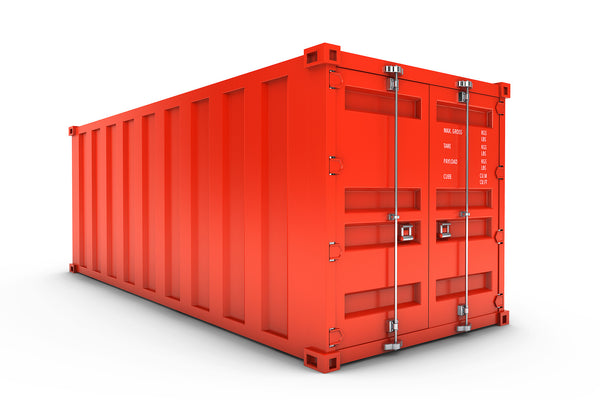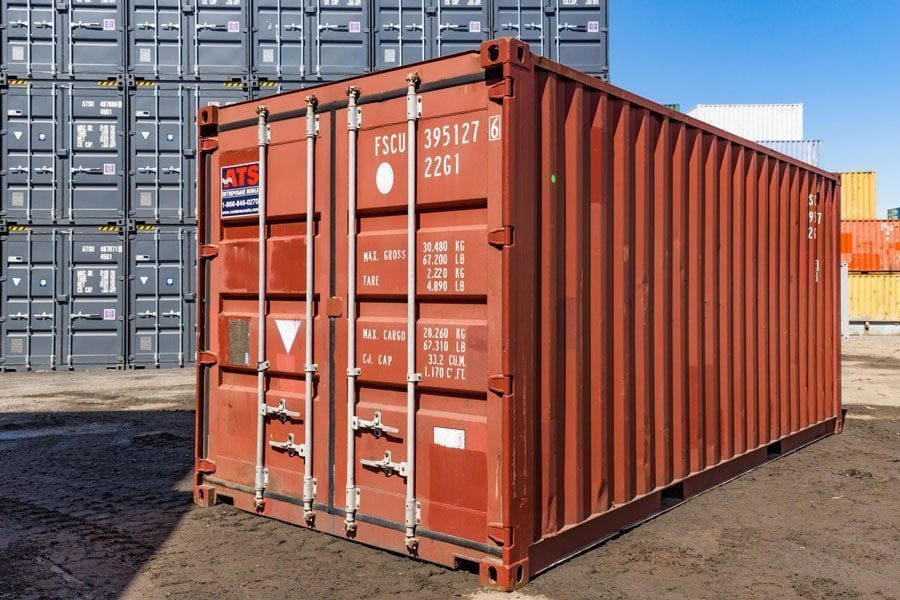The impact of a sea can for sale in emergency preparedness
Wiki Article
Everything You Need to Know About Shipping Containers and Their Practical Applications
Shipping containers have actually progressed from mere tools for transport to flexible frameworks with numerous practical applications. Their robust layout and basic sizing make them excellent for a range of usages past shipping. From cutting-edge housing options to sustainable farming, their versatility is noteworthy. Yet, the opportunities do not finish there. Exploring their various features exposes surprising understandings right into modern obstacles and creative remedies. What other functions could these containers play in today's globe?The Design and Structure of Shipping Containers

Inside, containers are designed to make best use of space, frequently featuring wooden or steel floor covering that can sustain substantial weight. Air flow systems may be included to stop dampness buildup, which is essential for sensitive cargo. In addition, reinforced corners enable easy handling by forklifts and cranes, promoting smooth loading and unloading. This thoughtful design and structure add to the containers' convenience throughout numerous delivery and storage space applications.
Advantages of Making Use Of Shipping Containers
While lots of transportation methods have their benefits, the use of shipping containers stands apart as a result of their unequaled convenience and performance. Shipping containers use a standard size, making them easy to stack and transport throughout different settings of transport, including trucks, trains, and ships. This standardization reduces filling and unloading times, thereby raising total efficiency.Shipping containers are created from long lasting materials, offering robust defense for products during transit. They are weather-resistant and safe, reducing the threat of damage from ecological factors or burglary. In addition, the modular design of shipping containers permits simple customization, allowing businesses to adjust them for various objectives, such as storage space or mobile offices.
Their portability and cost-effectiveness make delivery containers an attractive choice for services looking to streamline logistics and supply chain operations. These benefits add to the expanding appeal of delivery containers in numerous industries.
Creative Housing Solutions With Shipping Containers
Ingenious real estate remedies have actually emerged as an exciting application of shipping containers, leveraging their fundamental toughness for household usage. These flexible frameworks offer a lasting alternative to traditional building materials, usually at a fraction of the cost. Designers and designers have transformed containers right into trendy, useful homes, accommodating varied lifestyles and choices.

Moreover, delivering containers are eco-friendly, promoting recycling and lowering waste. Numerous projects focus on power efficiency, incorporating eco-friendly roofings and solar panels. As urbanization boosts, these cutting-edge housing options offer a functional action to real estate shortages while cultivating an unique building aesthetic.
Shipping Containers in Retail and Pop-Up Shops
A growing number of retailers are turning to shipping containers as a dynamic solution for pop-up shops and retail areas. These versatile frameworks offer a cost-efficient choice to conventional shops, allowing services to develop special, captivating environments that attract customers. Their modular design enables very easy transportation and setup, making them perfect for short-term or seasonal retail areas.Stores can customize delivery containers to show their brand name identity, changing them right click here for info into visually appealing stores that stand apart in congested marketplaces. The compact nature of containers additionally urges effective use room, permitting for creative formats that optimize consumer circulation and engagement. Moreover, shipping containers can be positioned in unique places, such as uninhabited whole lots or city parks, boosting ease of access and foot traffic.
As the retail landscape progresses, shipping containers supply a adaptable and cutting-edge remedy that fulfills the demands of modern consumers while improving the buying experience.
Lasting Farming Practices Using Shipping Containers
Sustainable farming practices progressively include shipping containers as innovative options for agriculture - shipping containers for sale near me. These container farms make use of hydroponics to optimize area and source efficiency, providing an economical strategy to food production. By transforming shipping containers right into farming hubs, farmers can deal with food safety and security and environmental issues all at onceContainer Farming Conveniences
While traditional farming deals with challenges such as land shortage and climate adjustment, container farming offers a feasible option that optimizes room and resources. This ingenious method permits year-round crop production in regulated environments, decreasing reliance on weather. Container ranches make use of less water than standard farming, advertising sustainability and preservation. They can be developed in city areas, bringing fresh produce closer to you could check here consumers and lowering transportation discharges. In addition, the modular nature of shipping containers enables scalability, enabling farmers to readjust procedures based on need. Container farming likewise lessens pesticide usage by creating an enclosed ecosystem, ultimately boosting food safety and security. As urban populations grow, container farming becomes a sensible remedy to meet the enhancing demand for neighborhood, lasting food resources.Hydroponics in Containers
Hydroponics, which enables plants to grow without soil by utilizing nutrient-rich water, prospers within the confines of shipping containers, making it a suitable technique for city farming. These containers create a regulated setting that optimizes temperature, moisture, and light, making it possible for year-round growing. With restricted room in metropolitan locations, delivering containers use a scalable remedy for growing fresh fruit and vegetables. Hydroponic systems within containers can include different methods, such as nutrient film strategy (NFT) and deep water culture (DWC), which make the most of yield while reducing water usage. This innovative approach not just boosts food safety and security yet also lowers the carbon impact associated with standard farming techniques. Hydroponics in containers stands for a forward-thinking service for lasting urban food manufacturing.Affordable Agriculture Solutions
As food production faces enhancing obstacles as a result of environment change and urbanization, shipping containers arise as an economical service for agriculture. These flexible structures can be repurposed for various sustainable farming practices, such as hydroponics and upright farming. By using controlled atmospheres within containers, farmers can maximize growth cycles and pop over here decrease source intake, including water and fertilizers. In addition, delivering containers can be strategically positioned in metropolitan areas, minimizing transport costs and improving access to fresh fruit and vegetables. Their modular nature enables scalability, making it possible for farmers to increase procedures as demand grows. Repurposing containers adds to throw away reduction, straightening with green agricultural campaigns. Overall, delivering containers present cutting-edge possibilities for sustainable and effective food production.Emergency Situation and Calamity Relief Applications of Shipping Containers

Organizations regularly make use of delivery containers to produce mobile facilities or area hospitals, making certain that treatment gets to those in requirement. Additionally, they can be transformed right into command facilities for working with rescue operations, therefore enhancing business performance during crises.
Moreover, containers can be modified to store necessary items such as water, food, and garments, protecting supplies until they are dispersed. Their flexibility enables them to be conveniently transferred to various locations, guaranteeing that assistance arrives where it is most quickly required. On the whole, shipping containers play a crucial role in enhancing the effectiveness of disaster relief initiatives worldwide.
Frequently Asked Questions
Just How Are Shipping Containers Transported From One Area to Another?
Shipping containers are transferred by means of ships, trucks, and trains, using cranes for discharging and filling. This multi-modal transportation system guarantees reliable activity throughout land and sea, linking international supply chains and helping with global trade.What Is the Typical Life Expectancy of a Delivery Container?
The typical life-span of a shipping container commonly ranges from 10 to 25 years, depending on maintenance, usage, and environmental variables. Proper care can extend their usability, while neglect may cause deterioration and damages.Can Shipping Containers Be Modified for Various Uses?
Yes, shipping containers can be changed for various usages. They act as homes, offices, pop-up shops, and storage devices. Their flexibility permits innovative adjustments, making them appropriate for a broad range of applications.Are Shipping Containers Eco-friendly?
Shipping containers can be eco-friendly, as they advertise repurposing and recycling. Their longevity lowers waste, while their use in alternate housing and organizations minimizes the need for brand-new products, adding to lasting methods.Exactly how Do I Select the Right Size Shipping Container?
To select the appropriate size shipping container, one should analyze storage demands, take into consideration the desired usage, and evaluate room schedule - Shipping Containers. Common dimensions include 20-foot and 40-foot containers, each offering numerous storage and transport requirements successfully
Ingenious housing solutions have actually emerged as an amazing application of shipping containers, leveraging their fundamental staminas for household use. The flexibility of shipping containers allows for imaginative layouts, from single-unit houses to complicated multi-container arrangements. Lasting farming methods increasingly integrate shipping containers as innovative options for farming. Furthermore, the modular nature of shipping containers enables scalability, allowing farmers to change operations based on demand. Hydroponics, which allows plants to grow without soil by making use of nutrient-rich water, flourishes within the confines of delivery containers, making it a perfect technique for metropolitan farming.
Report this wiki page